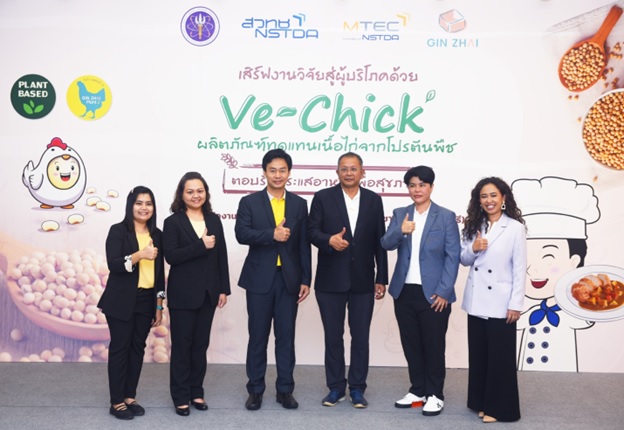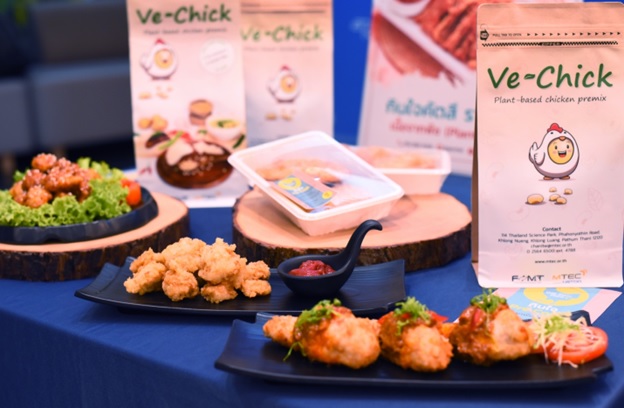To celebrate the vegetarian festival in Thailand, MTEC-NSTDA and BIG Natural Green announced the launch of plant-based chicken Ve-Chick on 26 September 2022. The announcement was made jointly by MTEC Executive Director Dr. Julathep Kajornchaiyakul and BIG Natural Green Managing Director Mr. Thaninrat Methiwatcharat, along with MTEC researcher Dr. Kamolwan Israkarn and BIG Natural Green executive officer Ms. Sureepon Chatmangmee.

The global plant-based foods market is estimated to be worth around USD4-30 billion and projected to reach USD8-70 billion by 2025. In Thailand, a quarter of its total population, around 17-18 million people, adopt the flexitarian diet - a style of eating that encourages eating mostly plant-based foods while allowing meat and other animal products in moderation. Recognizing this global trend, one of the research areas at MTEC Food Materials Research Team is the development of plant-based food.
Knowledge on food structure design and flavor was employed to create Ve-Chick, soy-based chicken meat with similar texture and taste to conventional chicken. Unlike real chicken, Ve-Chick is completely free from cholesterol and growth hormone residue.
BIG Natural Green is the latest company obtaining the license to commercialize Ve-Chick technology. Ve-Chick will support the company’s Gin Zhai brand which currently has two businesses: plant-based product Gin Zhai Plant J and Gin Zhai food kiosk franchise serving vegetarian dishes. The Gin Zhai Plant J will be available in two forms: “Gin Zhai Plant J – Pre-Cook” and “Gin Zhai Plant J – Pre-Mix”. The firm expects to open 100 Gin Zhai food kiosks within a year and sets to earn THB 200 million in revenue from Gin Zhai Plant J by 2024.

In addition to BIG Natural Green, Ve-Chick technology has been licensed to two other companies: an OEM food manufacturer and Green Spoons – a startup making healthy food.
Apart from Ve-Chick, MTEC has other plant-based proteins ready for commercialization such as M-Pro jelly drink (high-protein, calcium-fortified drink made from mung bean meal), fibrous chicken analogue (high-moisture meat analogue, HMMA, produced by an extrusion process) and minced pork analogue (low-moisture meat analogue, LMMA, produced by an extrusion process). The research team is also formulating food inks for 3D food printing - an emerging technology to structure foods from digital designs.
